Docudays UA moderator Natalia Zhebryk: “Unworthy behaviour cannot be a reason for infringing on human dignity”
Docudays UA moderator Natalia Zhebryk: “Unworthy behaviour cannot be a reason for infringing on human dignity”
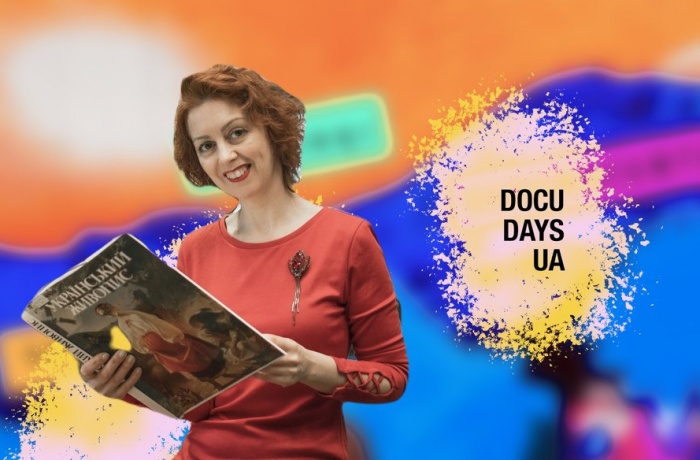
What helps Ukrainians to stop tanks with their bare hands? To fundraise millions for Bayraktar drones? The Travelling Docudays UA and Suspilne Culture have prepared ten stories about the resilience of Ukrainians which will help us find answers to these questions.
This is a conversation with Natalia Zhebryk, Head of NGO Civic Chamber of Ukraine, DOCU/CLUB Network mentor, moderator and leader of the Docudays UA club Potential. She talks about decentralisation, films as a way to speak about human rights, working with Ukrainian refugees, and the Travelling Festival in Poland.
ON HUMAN RIGHTS IN THE LANGUAGE OF DOCUMENTARY CINEMA
I came to my first Docudays UA in Kyiv with my kids. We were amazed by the format, the number and variety of events. Even back then, in 2014, it was such a modern, cool festival!
At the same time I was studying at the Human Rights Education House in Chernihiv. I got fully immersed in the topic of children’s, human rights protection and wanted to communicate that information to a broader audience. And at the festival I learned about the possibility of speaking in the language of human rights documentaries. I really liked both the format and the films.
And then in 2015 we launched the Docudays film club Potential in Dnipro, and a year later we applied for regional partnership with the Travelling Docudays UA Human Rights Documentary Film Festival. That was when it all began… We looked for partners in the region, starting with schools, colleges, universities. At first we focused on youth specifically, and then the audience was growing wider and wider. Our circle of partners also grew: we now had friendly libraries, NGOs and even businesses, we held screenings at coffee shops, hubs, book shops.
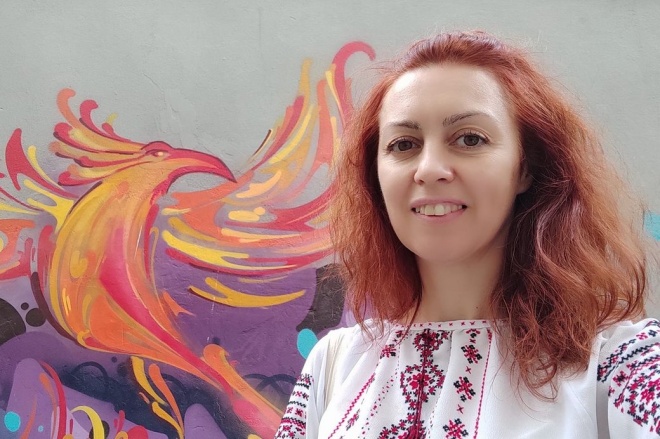
“WELL, YOU KNOW, THESE ‘DOCUS-SHMOKUS’ OF YOURS’”
While organising screenings, I’ve always relied on the people who want to talk about human rights and watch documentaries. Maybe it’s an easier way than knocking on “closed doors” and trying to convince people that they need rights.
But I believe that you can only build a productive dialogue when the person is already ready to receive information, when they already have a need for it.
My support were teachers, class teachers, head teachers, headmasters of education institutions. A lot in the education process depends on these people, they are the ones who make the decisions on what knowledge children should be given. I found like-minded people, those for whom my offer was relevant and timely, and it was a movement towards each other and human rights. Of course, it wasn’t always easy.
I clearly remember a characteristic case. A teacher invited me to hold a screening and discussion for her students. But she warned me that we had to coordinate the event with the school administration. After listening to my proposal, the headmaster said: “You know, these ‘docus-shmokus’ of yours… Who needs them? Better go do something useful than show films and talk about rights. You should tell children about their duties. That’s what you should tell them. Because otherwise what will grow out of them?”
But actually I’ve always thought that children should grow into a “who,” not “what,” and without knowing about human rights you will never grow into a “who.” We did conduct the screening after all, the headmaster didn’t support it but she didn’t ban it either.
I’m very happy about our collaboration with the Pedagogical College, it’s our regular partner in organising the Travelling Festival. The College’s students are future kindergarten and primary school teachers whose understanding of human dignity should be developed at the deepest level.
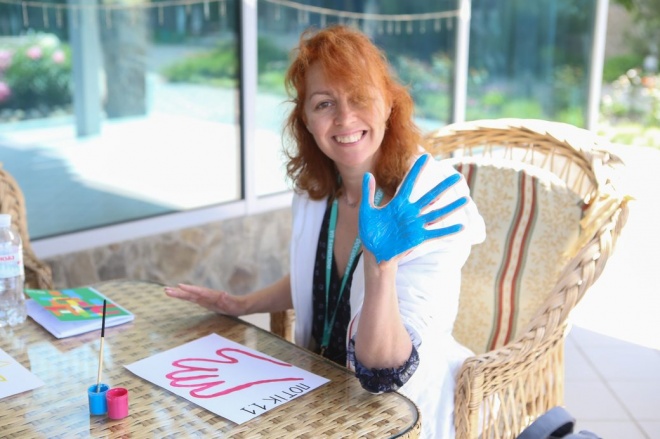
The students of pedagogy received a double benefit from our meetings. Firstly, they realised that they themselves (the majority of them are underage) have legal rights, they can decide things for themselves and correct the mistakes of older people in their lives. And secondly, we taught them to respect the rights of the children they were going to work with in the future. The most important thing in pedagogical practice is not to adopt a social mistake and not to carry it on into the future.
Educators must realise that there is human dignity and the dignity of a human being, and it is not the same thing. If a person, particularly a child, behaves in an unworthy way, they can be punished within the framework of a kindergarten or school’s rules.
But unworthy behaviour cannot be a reason for infringing on their human dignity and violating their human rights.
They should also realise that teaching can be respectful of a person rather than traumatic. All the cases when a child defends their boundaries and their right to privacy are not a whim but an important need for the development of their personality. Only then our children can grow into strong, creative personalities with an open potential who will bring a lot of good for society and the country in general.
DECENTRALISATION AND CINEMA
The period of decentralisation also began in 2014. Our first projects were aimed at activating young people and engaging them into elections and other state-making processes. The organisation I work for, NGO Civic Chamber of Ukraine, is a nationwide organisation, but each branch has defined their own area of work in their region. Some worked in the lawmaking sphere, while our team in Dnipro Region focused on working with the youth.
We sought to help communities create the conditions and atmosphere to let young people who have left villages and small towns to study return home and apply their new experience in their community.
The selection of festival films included strong films on this subject: New Heroes, Shut the F*ck Up and many others. They showed good examples of how it can be done. And most importantly that doing it is realistic.
In our work, we always make sure that our activities do not harm human dignity and human rights. We carefully assess how the changes we seek will affect everyone in the community, because they are individuals who have their own characteristics and differences. And to let everyone in the community live better, we should organise everything while taking into account the diversity that exists. We have often found this difficult to implement locally.
For example: “Let’s not accept a child with special developmental characteristics to the school,” we were told at one town. It took us a while to explain that we all have our own “special characteristics,” but it’s easier for us to ignore this than to be aware of it.
I felt how young Ukrainians were changing their country for the better, step by step. Because the point of decentralisation is not just to improve the quality of life and access to services at the community level but also to develop personal responsibility and opportunities to create change and policies at home.
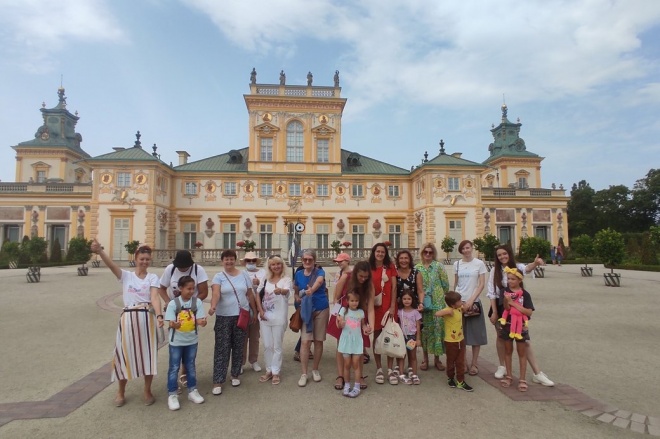
UKRAINE’S STRENGTH IS IN ITS PEOPLE, REGARDLESS OF WHERE IN THE WORLD THEY ARE RIGHT NOW
When the war started, everything changed. Right now I’m in Poland. It’s not an easy choice for me and my family. But Ukraine’s strength is in its people, regardless of where in the world they are right now.
In Warsaw, I work with female Ukrainian refugees in the team of NGO Centrum Praw Kobiet. Today I see my mission in giving as much support to female refugees as I can. I’m convinced that everyone has their own potential. The point of my work is to discover and support it.
Many years of practice working with people is very helpful for me now. Now I can share what I know, what really works and is useful. To do it professionally, I took classes from the projects Alternatives to Violence, Children and War: Healing Techniques, Theory and Practice of Art Therapy.
I organise support meetings using art therapy techniques which help people escape their stressed state and motivate them to keep living. I try to help women who have been forced to leave their homes hear each other and find support through communication. It is a difficult audience, many of these women have experienced such horror that they are still in critical mental states. People are suffering from losing their homes, loneliness and guilt, they are afraid for their family and loved ones, scared by lack of confidence in the future.
Each meeting has a topic: we discuss the participants’ experiences, analyse what works and what doesn’t, we learn to switch from desperation to a resourceful state. One component of these formats is creativity: neurographics, drawing, crafting. We also use bodily or breathing practices. These methods help people feel themselves here and now, they let their minds rest. By no means do we distance ourselves from problems in our lives and from the war, just like before we read news every day, we’re worried for Ukraine and waiting for the victory.
The traumatic events many of us have experienced will remain with us all our lives, but we can reduce their influence on us today in order to find the strength to move on, act, and bring our victory closer. Because there is so much work ahead of us.
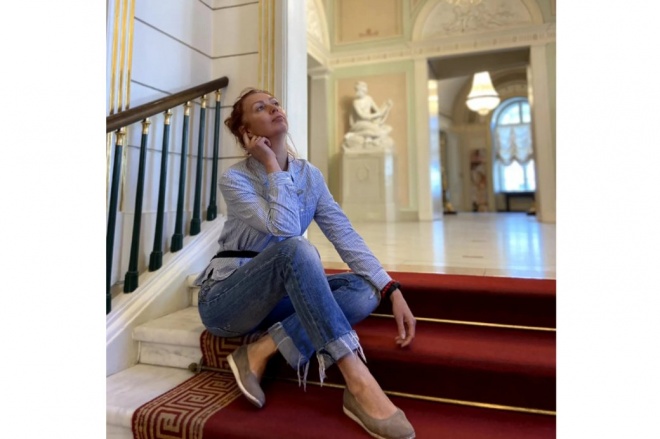
ON THE CROSSROADS OF HISTORY, OR THE TRAVELLING FESTIVAL IN POLAND
We have already held a series of integration screenings for the Poles to let them learn more about Ukrainian culture, about who modern Ukrainians are. I want to introduce them to the festival, to our format, tell them about our filmmakers, what issues we raise at the screenings and why we do it.
The Travelling Festival this year is a unique opportunity to show modern films about the present. The festival’s programme is extremely relevant every year, and it has always resonated with the audience, the protagonists of the films are people who live among us, we can even google them. And this inspires the audience to act: if they could do it, I can, too.
I plan to make my Travelling Festival this year an integration experience. We already have preliminary arrangements with the Ukrainian Warsaw House about film meetings, and a few other locations have agreed to host the festival. I feel support from the Poles, they believe these meetings to be important and useful.
Many Ukrainians don’t know the culture of the Poles and how they live, just as the Poles know little about Ukrainians.
And films by contemporary Ukrainian filmmakers are an honest story about our country.
I really like the fact that the festival is not political, but rather it focuses on universal human values, and this unites us all. It is no secret that Poland and Ukraine have controversial moments on the crossroads of history, some Polish people are still wary of Ukrainians. There are people who have been poisoned by Russian propaganda. So we need to be very careful about what we emphasise. And the best way to do it is through honest documentary films.
I don’t plan to include “painful films” into the programme, because I don’t know what can trigger my audience right now, these days that is difficult to predict. I always try to make sure that the viewers have motivation to keep on living and act after each screening.
Interview recorded by Inna Kondratyeva